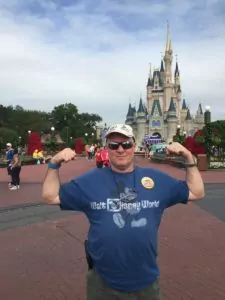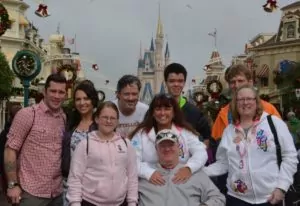By David Morrill, VeDA Ambassador
 I recently went on a vacation with my family. I have been on many vacations, but his one was much different, and I learned a lot about myself, my family, and mostly my disability. This was my first vacation since suffering a stroke, which left me with permanent vestibular damage. I am writing this in hopes that it will inspire other people with disabilities to find the best way to travel and vacation.
I recently went on a vacation with my family. I have been on many vacations, but his one was much different, and I learned a lot about myself, my family, and mostly my disability. This was my first vacation since suffering a stroke, which left me with permanent vestibular damage. I am writing this in hopes that it will inspire other people with disabilities to find the best way to travel and vacation.
My family and I traveled 1,500 miles to conquer the vestibular maze known as Disney World. After having traversed 3 airports we finally made it to the hotel, where I decided I would try an experiment. We were visiting downtown Disney, which has an array of shops and a dense population of people. I told my family that I wanted to at least try and walk to see how it would be on my body and brain. After walking that night I cane home completely dizzy and off balance. I had extreme leg pain, and could hardly walk the next day. I was so disappointed that I had worked so hard and still couldn’t do just 1 day without a wheelchair. That night I broke down and cried. From that point forward I knew that the rest of my trip would have to be done using a wheelchair.
 First I need to tell you how I became disabled, then I will tell you what I learned on this most important trip. I have a vestibular disorder that leaves me dizzy and unbalanced all the time. This came about as a complication of a recent stroke. I felt I needed to share my experiences in hopes that this will either inspire or help others to travel and vacation as smoothly as possible.
First I need to tell you how I became disabled, then I will tell you what I learned on this most important trip. I have a vestibular disorder that leaves me dizzy and unbalanced all the time. This came about as a complication of a recent stroke. I felt I needed to share my experiences in hopes that this will either inspire or help others to travel and vacation as smoothly as possible.
I know that all vestibular disorders are different, and some people have conditions that are worst than mine. Before planning a vacation, check with your doctor to make sure it is safe to travel. After getting clearance by your doctor advance planning is the key to success. I started pre- planning my trip about 6 months out, which gave me a lot of time to test different ideas and theories. Here are some of the things I did and how they worked out for me.
Like I said previously all disorders are different, you should know and learn as much about your disorder as possible. That way you know what triggers your individual disorder. Once you figure out what your triggers are you can experiment with different ways to accommodate your individual disorder. This is an example that I used to make my trip go more smoothly. One of my triggers is I get dizzy and unbalanced in open spaces as well as in crowds. Does this sound familiar to any one? Of course it does, it is very common in the vestibular world. With my disorder, if I am sitting my balance is much better. So my wife suggested that we consider a wheelchair, and after a lot of uncertainty on my part I finally agreed. This took a lot of thought on my part, mainly because I felt I didn’t belong or need a wheelchair. I did my best to build my strength and did a walking routine that was up to 3 miles a day on the treadmill. After several months of training I decided to test my theory. My wife, son and I went to a local summer fair. I knew this would be small in comparison to Disney, so it was a test to see how my walking was preparing me to walk the several miles at Disney. After arriving at the fair I had to deal with the crowds, the lights and visual stimulation, and the ever changing ground from grass to pavement. It didn’t take but 2 hours for me to feel weak, lame, and totally dizzy. I had worked so hard so I was very disappointed that I could only do that amount of time. You see, I can walk as many miles as I want to prepare, but my damaged brain still wasn’t getting the correct information to process all the information in that busy environment. My wife and I had several conversations about using the wheelchair. Finally the point she made about being able to spend more time with my family convinced me that it was best to do it that way.
The next thing I would like to talk about is communication. Communication is the key to a successful vacation if you are disabled. You need to discuss with your family, friends, or whoever is going on the trip with you what your goals and expectations are for the trip.
 In my case I talked with my entire party, which consistent of 9 people. I let them know what my expectations were and what kinds of backup plans we had in place. We decided that if I became too tired or overwhelmed another adult in our party would accompany me back to our hotel to get some rest. It was important to me that the other members of my party didn’t have to follow me everywhere, after all, they were there to vacation as well.
In my case I talked with my entire party, which consistent of 9 people. I let them know what my expectations were and what kinds of backup plans we had in place. We decided that if I became too tired or overwhelmed another adult in our party would accompany me back to our hotel to get some rest. It was important to me that the other members of my party didn’t have to follow me everywhere, after all, they were there to vacation as well.
I also need to touch on some common sense practices that most people do anyway, but are very important if you have a medical or physical impairment. Staying hydrated, eating properly and timely, as well as keeping your medication on correct schedule. Especially with a vestibular disorder or any brain injury make sure you take several rest breaks or just some quite time. I did this when others went on a ride that I couldn’t do. Finally, don’t dwell on your disorder. Everyone was there to have fun and relax, including me. I tried staying upbeat and positive and laughed and smiled more during that week then I have in a long while. I also wanted to be prepared in case someone asked why I was using a wheelchair, because there were times that I stood and walked and acted like I was a normal person. I decided that I would use the opportunity to educate people about how this disorder feels and how hard it is to do simple things sometimes. Education is the key to helping others understand so they can empathize with what we are going through.
Lastly, I would like to tell you how my actual vacation went, what kinds of obstacles I faced, and what kinds of challenges I overcame. First of all, I would like to take a few minutes to thank my entire family who all contributed to my successful vacation. They helped me by pushing my wheelchair and slowing down so I would feel comfortable. My wife who has stood behind me 100 percent since day one after my stroke is always my rock, and she watched out for me to make sure I wasn’t overdoing it. Using the wheelchair helped me tremendously cut down on my dizziness, but getting around a site as large as Disney had some challenges. Stores as well as streets and sidewalks are continually crowed and navigating a wheelchair is much harder then I imagined. I commend people who have to do it all the time. I went on most rides except for a couple of extreme rides that my wife wouldn’t budge as I tried to persuade her to let me try them. That was probably the right decision on her part. Overall we all had a great time we learned a lot about vacationing, our family and the respect we all have for people with a disability.
I hope to encourage others with a vestibular disorder to take a well deserved vacation. Although it takes planning, dedication, communication, and a lot of will, all of us deserve a vacation to help reset our goals and our lives. Although you may not want to take on the extreme craziness of Disney, you can still plan some time away, even if it’s just a few days. Hopefully my journey will lead to your journey. Thank you very much for taking a few minutes listen to my perspective.
